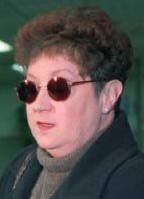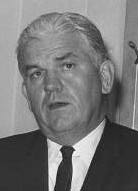
ABORTION
Roe vs. Wade didn't look like history maker
* The ordinary-turned -extraordinary case had an unusual cast of characters.
Published: Monday, January 19, 1998

Norma McCorvey
aka 'Jane Roe' |

Henry Wade |
By Christi Harlan
Cox News Service
DALLAS - The picketers were in place before the first word of argument was
spoken in the case of Roe vs. Wade. Outside the old federal courthouse in
Dallas, five members of the ``Women's Liberation Movement,'' as reported by
the defunct Dallas Times Herald , carried signs protesting the Texas law that
made it illegal for doctors or anyone else to perform abortions.
Inside the courthouse on that May day in 1970, two inexperienced lawyers
were preparing to tell three federal judges the Texas abortion law should be
thrown out. Two more veteran lawyers, representing Attorney General Crawford
Martin and Dallas County District Attorney Henry Wade, were ready to argue
that the law should stand.
At that point, Roe vs. Wade was just another civil lawsuit pending in
federal court in Dallas.
``Back in those days, there were a lot of these actions that were being
filed against various statutes,'' said John Tolle, who was the entire civil
and federal division of Wade's office. ``Every time there'd be some problem,
someone would attack a statute on the grounds that it was unconstitutional.
... This was just another one when it started off.''
The case wasn't even unique as a challenge to a state's abortion law: at
least a half-dozen similar cases were moving through courts in other states.
Sarah Weddington admits that she and her co-counsel, Linda Coffee, were
``piling on'' when they filed Roe vs. Wade .
``One of the reasons the Supreme Court will often take a case is if they
have a whole lot of other cases pending around the country on one key issue,''
Weddington said. ``So Linda and I saw our roles as adding to the mountain of
litigation. We thought it would help push some other case up there. ... We
were not thinking of it as a U.S. Supreme Court case.''
Despite the low expectations of the lawyers on both sides, Roe vs. Wade
became the abortion case, overturning Texas's law and every statute in the
United States that restricted a woman's ability to get an abortion.
The Supreme Court's ruling, delivered 25 years ago this week, has affected
so many people it is easy to overlook the handful who were involved when Roe
vs. Wade was just another case. The key players:
Henry Wade
As Texas' top law-enforcement officer in Dallas County, District Attorney
Henry Wade was accustomed to being sued.
If someone wanted to stop the enforcement of a state law in Dallas, Wade
was the person to name. Never mind that Wade, then barely halfway through a
36-year career as district attorney, had already built a powerful office full
of some of the brightest and toughest lawyers in Texas.
Never mind that just seven years before Roe sued him, Wade had been
preparing to prosecute Lee Harvey Oswald for assassinating President Kennedy
because there was no federal law against assassination at the time. And when
Jack Ruby shot Oswald, Wade joined three of his assistants in the courtroom to
win a murder conviction against Ruby.
Jane Roe's civil lawsuit was no different from any other, and Wade handed
it off to Assistant District Attorney John B. Tolle Jr., who had worked as a
barkeeper for several years before going to law school and joining Wade's
office in 1968. Wade, who retired as district attorney in 1986 and still lives
in Dallas, stayed out of the case.
``This may be terribly arrogant, but I thought we were going to win it,''
said Tolle, who is now about to retire after 19 years as a federal magistrate
in Dallas.
Sarah Weddington and Linda Coffee
Sizing up Roe's lawyers, Sarah Weddington and Linda Coffee, Tolle had every
reason to believe that he would defeat their lawsuit.
Weddington had graduated from the University of Texas Law School in August
1967, and Coffee in January 1968.
Weddington had never tried a contested case. Coffee, at least, had worked
as a law clerk for the late U.S. District Judge Sarah T. Hughes in Dallas and
had begun a career at a Dallas law firm specializing in bankruptcy.
``It's still amazing how little cost was involved,'' Coffee said recently
at the Dallas law firm where she still specializes in bankruptcy law. ``We
didn't have any financing ... (and) there wasn't a lot of traditional-type
research to do because there weren't any cases'' in which courts had ruled on
whether the Constitution provided a right to choose abortion.
Coffee never caught the limelight the way Weddington did after the Supreme
Court ruled in their favor on Jan. 22, 1973. She said she made several
speeches to church groups and others immediately after the ruling and recently
said she'd like to write a book, ``but I think just about everything's been
said.''
Weddington, whose 1992 book A Matter of Choice revealed her own abortion
in Mexico in 1967, seems to have never stepped off of the abortion- rights
stage.
This spring, she'll be on an unpaid leave of absence from her teaching job
at the University of Texas while she travels the country speaking and
campaigning for abortion-rights congressional candidates. That's pretty much
what she has been doing since the day she got word of the decision at the
state Capitol, where she was a Democratic state representative from Austin.
Rep. Weddington's comments on what she knew of the decision - in those days
of no faxes or e-mail, the Supreme Court mailed opinions to the lawyers - were
buried inside Texas newspapers. The court ruled on the same day that former
President Lyndon B. Johnson died, and every front page in Texas was full of
that story.
Asked now if she would have done anything differently in Roe vs. Wade,
Weddington's answer is curt: ``Pick a different plaintiff.''
`Jane Roe'
``I thought that the plaintiff would be anonymous and never expected that
person ever to be public,'' Weddington said.
The fake name of Jane Roe was supposed to protect an unmarried, pregnant,
mostly homeless hippie - not only because she wanted an illegal abortion, but
also because of the stigma then attached to pregnant single women.
``Roe'' was chosen because Weddington and Coffee were already representing
``John and Mary Doe,'' a married couple whose anonymous challenge to Texas'
abortion law never made it to the Supreme Court.
``Today, if you're doing a suit, you think about `Is this a person who
deals well with the media?''' Weddington said. ``You would think of a lot of
things today that we didn't think about.''
But no one heard from Roe. In fact, there was no testimony in the trial -
just lawyers arguing law theory for three hours.
Norma McCorvey would step forward as Jane Roe years later, but the surprise
of her willingness to go public and speak out for abortion rights would be
eclipsed in 1995 by her renunciation of abortion.
Baby Roe
McCorvey never got the abortion she was seeking when Jane Roe's lawsuit was
filed. The one clinic she visited made her sick to her stomach, and, then,
time ran out.
``There's been about 36 women who've contacted me by mail or sent tapes
saying they're the famous Roe baby,'' McCorvey said.
``There's only one drawback to that - I only had one baby that day,'' she
said.
Baby Roe was adopted, and McCorvey is not certain she wants to meet her.
``I just don't know what good it would be,'' she said. ``The only thing I
could possibly1 1 1 offer her is either my jocularity or a cigarette,
and maybe the reason I couldn't keep her.
``And that would be all....''


